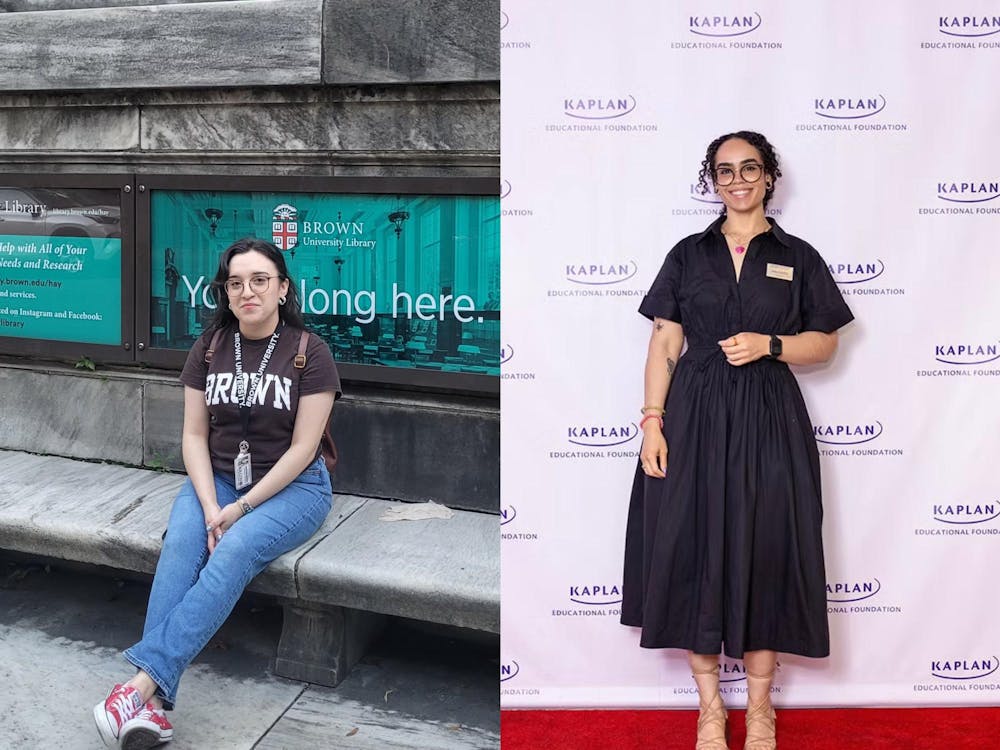When Genesis Torres ’28 was preparing to open her college decision letters last spring, it was “very nerve-wracking,” to say the least.
“Brown was my number one school, so there (were) no other options for me. Even though I got accepted to other schools, like ‘no, I’m going to Brown,’” she recalled thinking.
When she saw her acceptance, she started packing her things immediately. “I was ready,” she said. “I wanted to move then and there.”
Torres and Joely Castillo ’28, both at Brown, are members of the Kaplan Leadership Program’s 17th cohort of just ten scholars.
The program, run by the Kaplan Educational Foundation, offers financial assistance, tutoring and other aid to low-income and underrepresented community college students. Students enrolled in an associate degree program at specific community colleges in New York and New Jersey are eligible to apply.
Castillo received her decision in the middle of the work day. “When I found out, I was literally cooking for the kids that I nanny,” she said. The acceptance brought tears to her eyes.
“There were so many doubts throughout my life … that I would never get to this point,” Castillo said. “I thought that my ethnic background, my social background … made it so that I would never get to go to college.”
“That message kind of defied the reality that I had created for myself,” they added.
Other members of the cohort are attending Princeton, Lawrence University, Smith College, Mount Holyoke College and the University of Southern California.
Last year, Torres and Castillo graduated from Borough of Manhattan Community College in New York, where they earned degrees in Psychology and Ethnic Studies, respectively. Both were encouraged to apply to Kaplan’s program by their advisors.
“When you have a community college, especially situated within New York City or in New Jersey, a lot of the students, of course, are commuting,” Castillo said. “They’re working a job, and probably paying rent, sustaining themselves, as well as going to school full time.”
Castillo believes that Kaplan’s relationship with community colleges helps connect students to resources that they otherwise may not have learned about, citing it as the only reason she could access the program in the first place.
For Torres and Castillo, who are both Resumed Undergraduate Education applicants, Brown’s support for RUE students was one of the main reasons why they enrolled.
The RUE program is a selective admissions pipeline for students who have been out of high school for at least six years by their Brown enrollment.
“I feel like non-traditional students can often come into their undergraduate experience and feel … ostracized, (or) maybe feeling like you can’t quite get back into the swing of school,” Castillo said.
For Castillo, the fact that non-traditional students receive extra advisors made her feel like Brown was “really invested in your success.”
Brown’s Open Curriculum also aligned with Torres’s wide array of academic interests. “I wanted to be able to complete a concentration but also … take some random classes for fun,” she said.
Torres intends to study Cognitive Neuroscience at Brown. She cited her own experience with attention deficit hyperactivity disorder as one of the reasons why she’s interested in the field.
“I fell in love with genetics and psychology trying to get to know myself,” she began. “I really loved being able to help other people in that realm.”
Castillo plans to explore Cultural Anthropology and Latin American and Caribbean Studies. With her family coming from the Dominican Republic, they view their academic pursuits as a way to better understand herself, her family and those living in her neighborhoods and her country.
“I feel it’s my job to be able to elevate people’s voices on what it’s like to have our experiences,” they said.
For Castillo, the opportunity to study at Brown is a “privilege.”
“I have the opportunity to sit and focus on the materials that I find engaging and … not have to split my brain power and mental health between keeping myself sheltered and fed and also getting an education,” she said.
Torres noted that Kaplan’s program helped expand her sense of self-worth. “I didn’t think I would ever get into Brown … but they made it known to me that I am worth it,” she said.
For Torres, acknowledging the value of past experiences is key for overcoming impostor syndrome among students who are from marginalized backgrounds. “When you feel like you are behind in some kind of skill or knowledge, you are not. You just have a different route,” she said.
“I feel empowered to be here,” Castillo said. “I feel the need to take up space, and I’m not shy about it.”
Correction: A previous version of this article incorrectly attributed a quote by Castillo to a different source. The Herald regrets the error.

Aniyah Nelson is a University News editor overseeing the undergraduate student life beat. She is a senior from Cleveland, Ohio concentrating in Political Science and Sociology. In her free time, she enjoys listening to music and watching bloopers from The Office.





